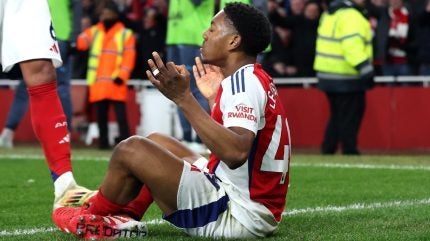
Visit Rwanda has been actively involved in the global sports sponsorship market since 2017 when it became Arsenal’s first official sleeve partner.
This deal is still active today and is worth $14.05 million a year to the North London club. Sleeve sponsorship offers prime branding opportunities, with guaranteed exposure on TV and across the club’s social media pages.
It is one of only a limited number of sponsorship opportunities to offer such vast exposure and branding. In its eighth season in partnership together, however, criticism against the relationship has got louder as military tensions in Central Africa become more publicized in mainstream global media.
Anti-Rwandan sentiment has been growing on the back of Rwandan links to supporting M23 rebel armies fighting in the Democratic Republic (DR) of Congo. These links have been claimed and supported by the Congolese president, Félix Tshisekedi, and the United Nations.
Rwandan leader, Paul Kagame, has not admitted providing support to M23 rebels but has retained a defiant stance that he will do anything to defend his country.
Kagame has retained military interest in the DR Congo for years, targeting action against those who fled to the DR Congo after involvement in the 1994 Rwandan genocide, one of history’s biggest massacres, with 800,000 deaths.
Sport often tries to separate itself from political issues but the size and power of sport means this is almost impossible. Some of the biggest moments in sporting history have arisen in the backdrop of bigger political storylines.
The best way to avoid connections to sensitive issues is to distance yourself from the source that connects you. For Arsenal, its connection to the Rwandan controversies in the DR Congo relates to its sleeve partnership.
The same is also true for Bayern Munich and Paris Saint Germain who are linked to the country through ‘Visit Rwanda’ sponsorship deals. These two deals are also worth millions a year to the clubs, with Bayern Munich’s five-year agreement valued at $6 million (annually) and PSG’s training & warm-up kit sponsorship worth $12.5 million (annually).
These three partnerships offer a global platform for Rwandan tourism and promote positive ties to the nation. Former soccer captain of the DR Congo, Youssouf Mulumbu, added his vocalized support to opposition cries to the clubs to disassociate themselves from the Rwandan sponsorship deal.
The trio of soccer clubs are yet to denounce or terminate their partnerships. The fallout from sponsorship connections with Visit Rwanda has already been experienced in global sport, however, via the Basketball Africa League (BAL), for which Visit Rwanda remains a founding partner of the competition.
Burundian club, Dynamo BBC officially withdrew from the BAL after refusing to don the brand’s visible signage on its competition shirts. Dynamo BBC initially covered up the brand logo in its opening game before forfeiting its next two matches.
Despite the negative links associated with the partnership, none of the three European soccer giants have acted quickly to disassociate themselves. Back in 2022, there was no such hesitation from European and global sports properties in disassociating themselves from negative political/military links to the Russian invasion of Ukraine.
The world of sport acted quickly to defy the actions of Russia and the nation’s position in global sport was immediately affected. To highlight some examples of this, the 2022 UEFA Champions League final was moved from Saint Petersburg, Russia, to Paris, France; Uralkali’s title partnership with Haas was terminated; Manchester United ended its airline deal with Aeroflot; and Schalke 04 ended its longtime major partnership with Gazprom.
There is a sense of the conflict being so far out of direct consciousness for these clubs that they do not have to act immediately. The outrage against Rwanda is currently not as vocalized in European media outlets as the Russian conflict in Ukraine was.
The mass backlash and retaliation across international sport showed a unified position and stance against the Russia-Ukraine conflict but this is not going to happen on the same scale for the events in Central Africa.
As such, there is not the same pressure to comply with what the world expects and follow the masses. Arsenal, Bayern Munich, and PSG are the only major sports properties that could act against Rwanda. With no official or direct links to Visit Rwanda and/or the conflict in DR Congo, the clubs are weighing up their options and taking their time to consider their next actions.
They are balancing the PR hit against the millions of dollars being generated from the partnership and money often talks. A ripple effect would be expected should one of these clubs denounce their partnership, encouraging the others to rally behind its opposition.
Ethically, we want to see these clubs terminate their partnerships and distance themselves from such headlines but for now, they remain silent.



